50+ Medical (Health Care) Power of Attorney Form Samples & Templates
-
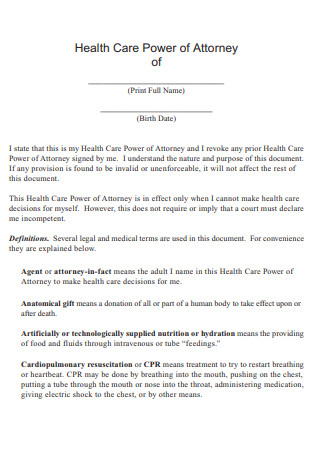
Health Care Power of Attorney
-
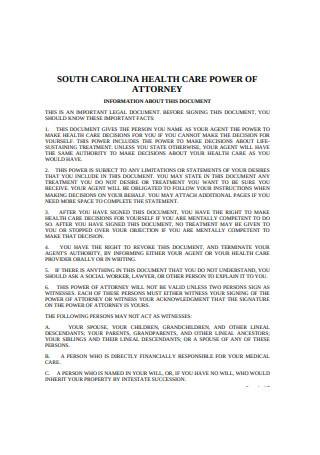
Sample Health Care Power of Attorney
-
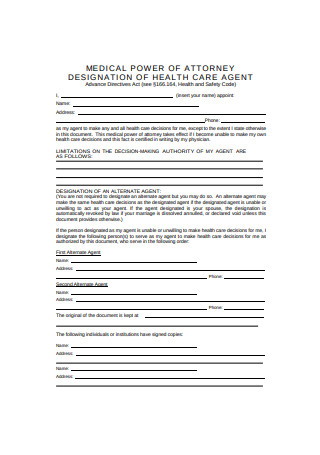
Medical Power of Attorney Designation of Health Care Agent
-
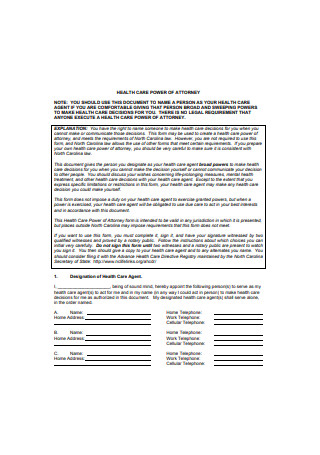
Health Care Power of Attorney for Agent
-
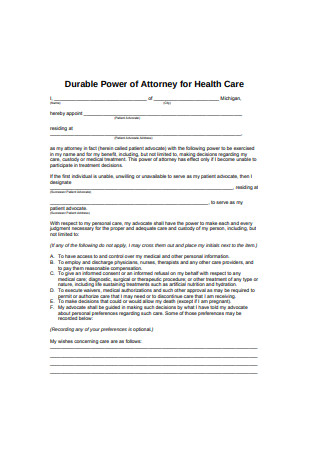
Durable Power of Attorney for Health Care
-
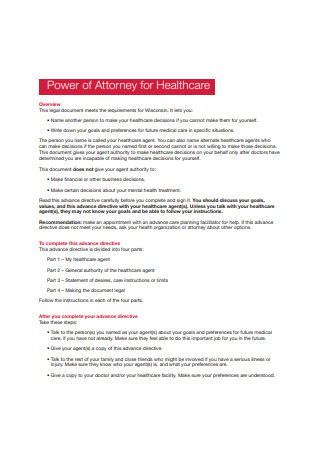
Power of Attorney for Healthcare
-
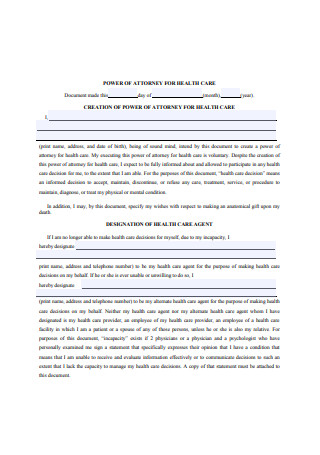
Creation of Power of Attorney for Health Care
-
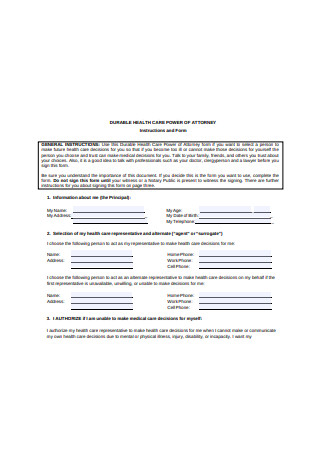
Durable Healthcare Power of Attorney
-
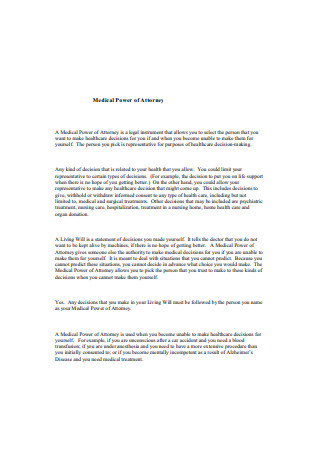
Medical Power of Attorney
-
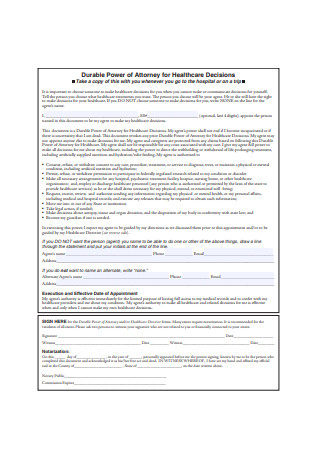
Durable Power of Attorney for Healthcare Decisions
-
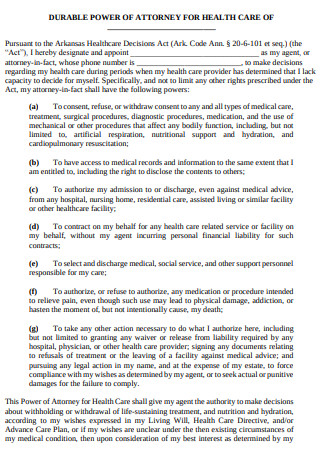
Format of Durable Power of Attorney for Health Care
-
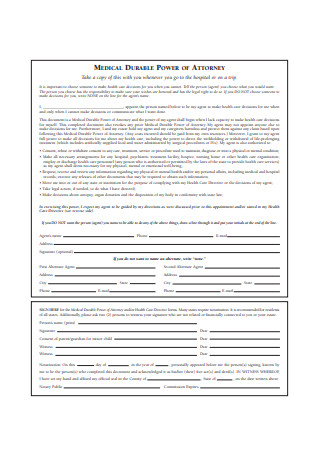
Medical Durable Power of Attorney
-
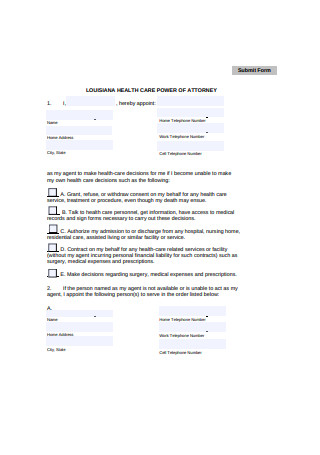
Simple Health Care Power of Attorney
-
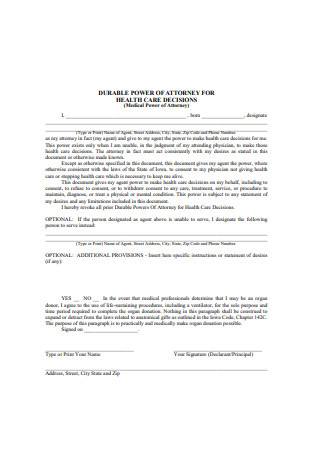
Sample Durable Power of Attorney for Healthcare Decisions
-
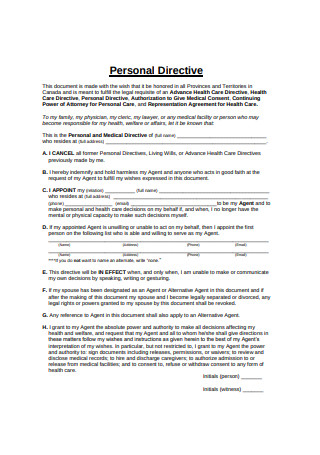
Personal Directive Medical Power of Attorney Form
-
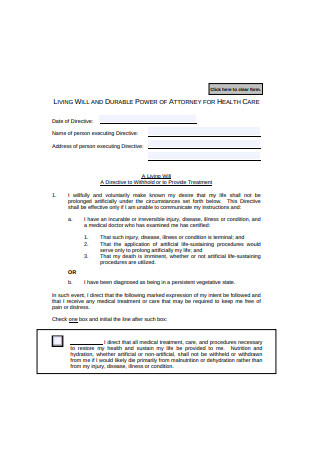
Living Will and Durable Power of Attorney for Health Care
-
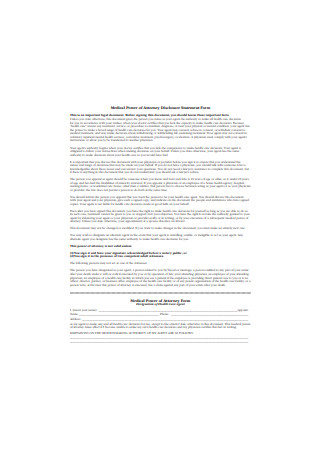
Medical Power of Attorney Disclosure Statement Form
-
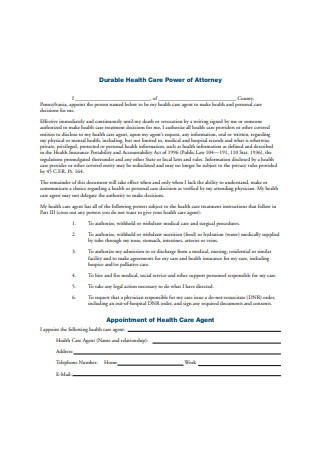
Combined Living Will and Health Care Power of Attorney
-
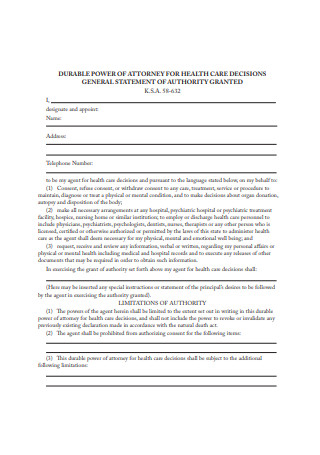
General Statement of Durable Power of Attorney for Healthcare Decision
-
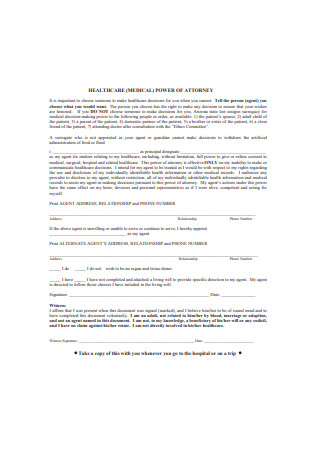
Healthcare Medical Power of Attorney
-
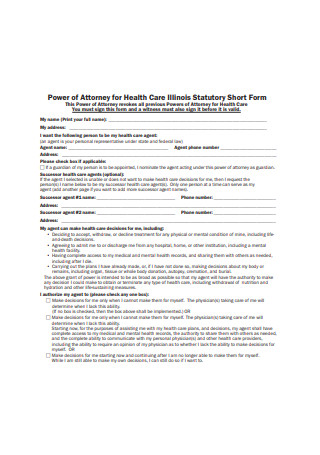
Power of Attorney for Health Care Illinois Statutory Short Form
-
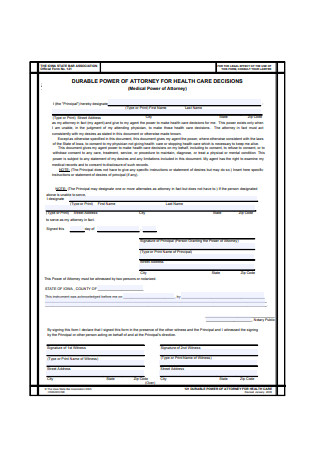
Medical Durable Power of Attorney for Healthcare Decisions
-
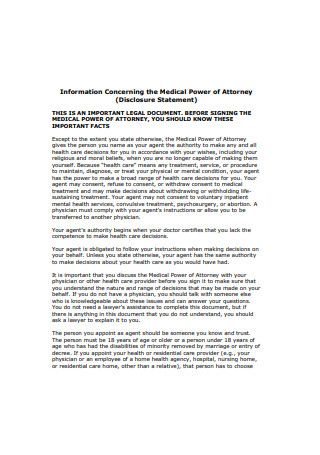
Information Concerning the Medical Power of Attorney
-
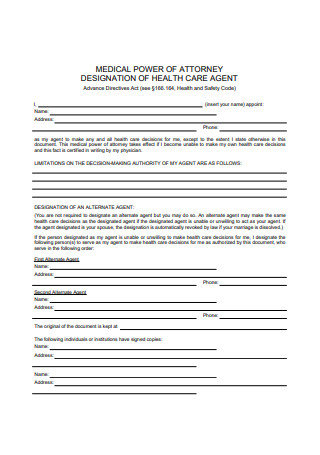
Sample Medical Power of Attorney Designation for Healthcare Agent
-
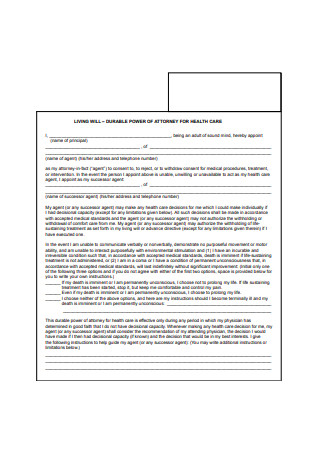
Sample Living Will Durable Power of Attorney for Healthcare
-
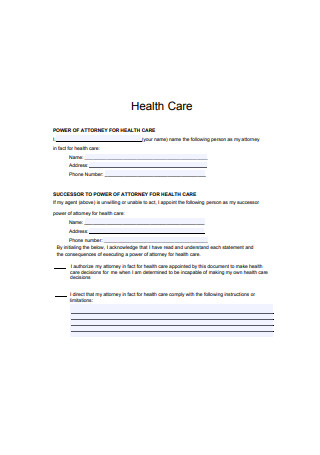
Sample Power of Attorney for Healthcare
-
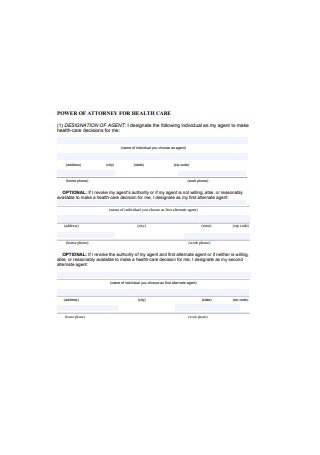
Power of Attorney for Healthcare Example
-
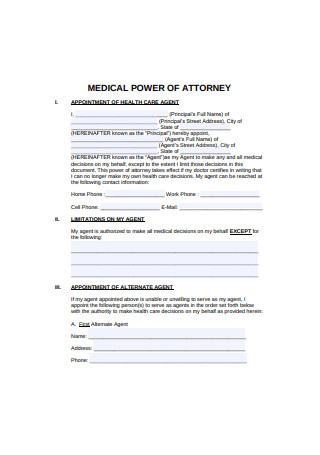
Medical Power of Attorney Format
-
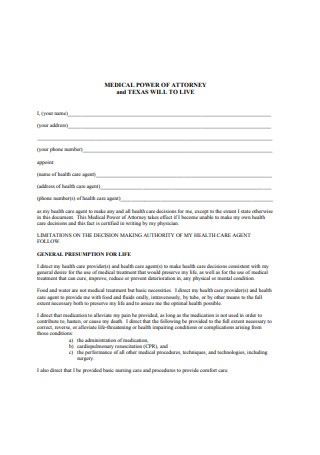
Medical Power of Attorney and Texas Will to Live
-
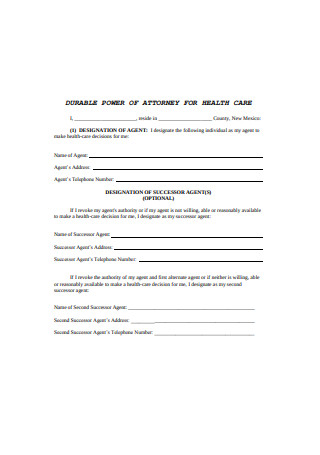
Durable Power of Attorney for Health Care Example
-
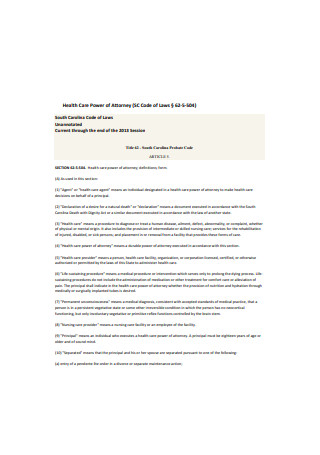
Formal Health Care Power of Attorney
-
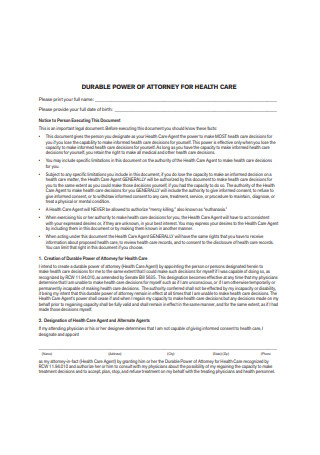
Durable Power of Attorney for Healthcare Format
-
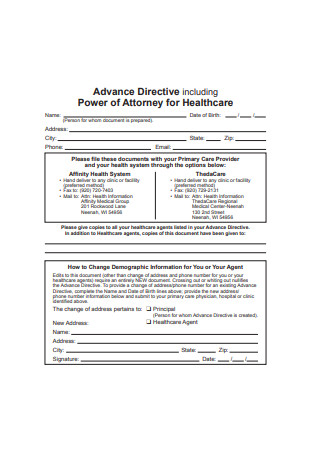
Advance Directive Including Power of Attorney for Healthcare
-
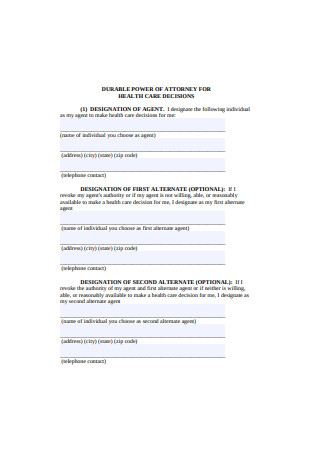
Durable Power of Attorney for Healthcare Decisions Example
-
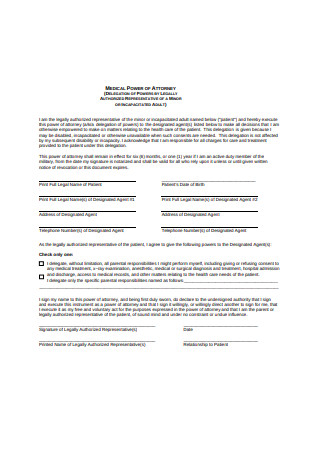
Medical Power of Attorney Example
-
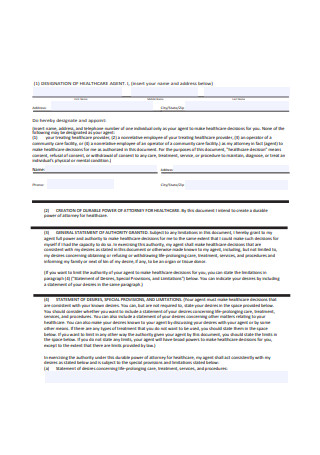
Durable Power of Attorney for Healthcare Statutory Form
-
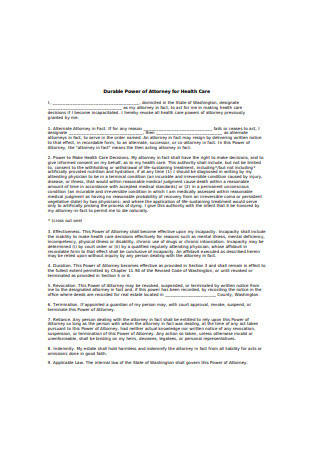
Standard Durable Power of Attorney for Healthcare
-
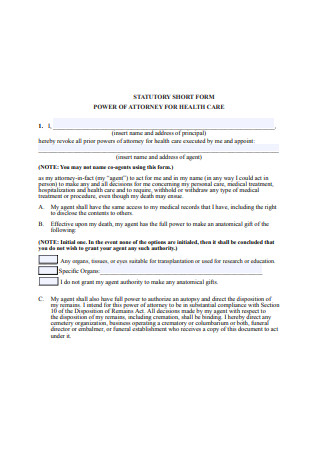
Standard Short Form Power of Attorney for Healthcare
-
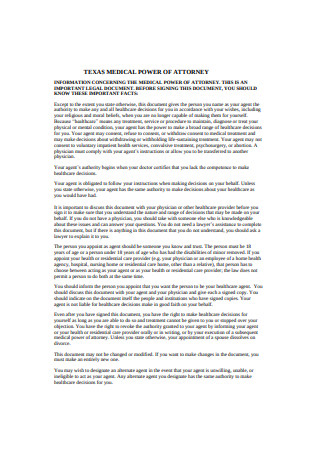
Texas Medical Power of Attorney
-
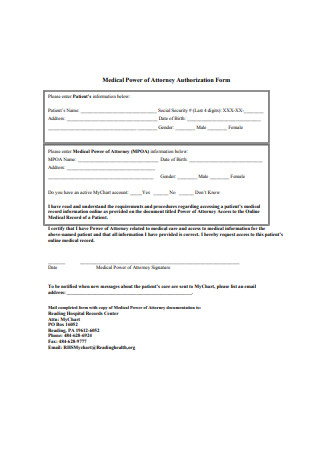
Medical Power of Attorney Authorization Form
-
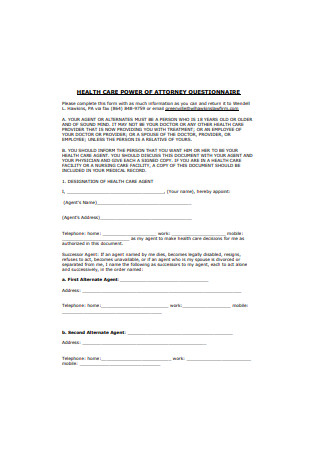
Health Care Power of Attorney Questionnaire
-
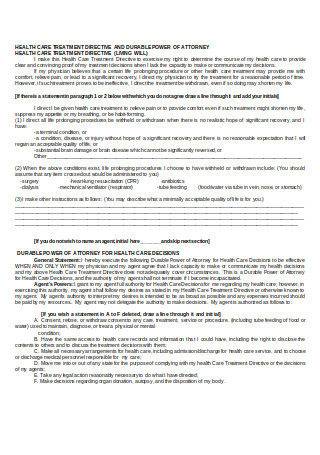
Healthcare Treatment Derective and Durable Power of Attorney
-
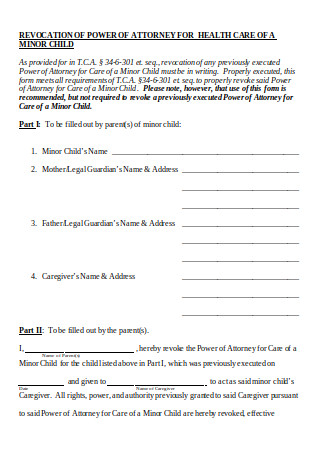
Revocation of Power of Attorney for Healthcare of Minor Child
-
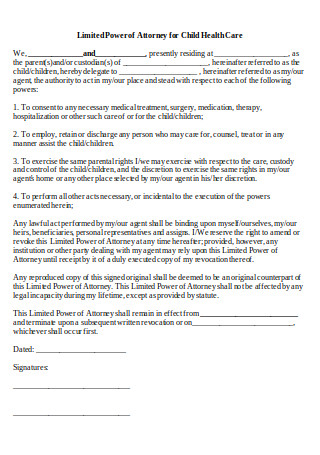
Limited Power of Attorney for Child Health Care
-
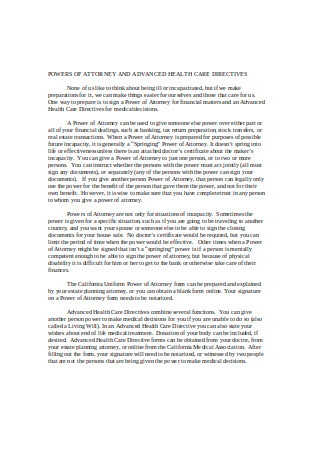
Power of Attorney and Advanced Healthcare Derivatives
-
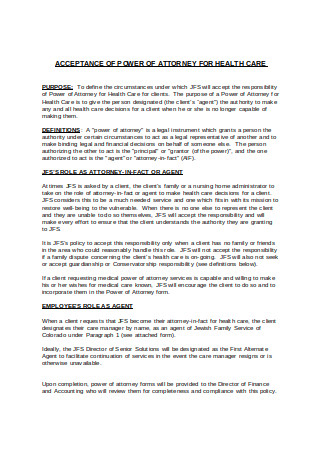
Acceptance of Power of Attorney for Health Care
-
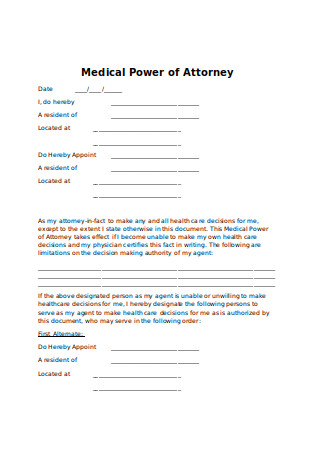
Sample Medical Power of Attorney
-
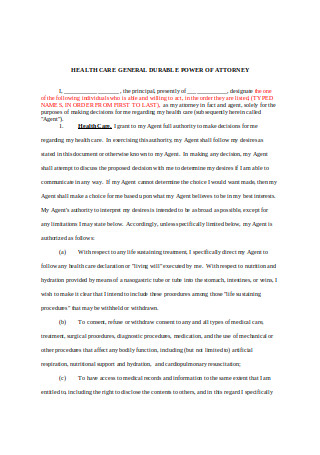
Health Care General Durable Power of Attorney
-
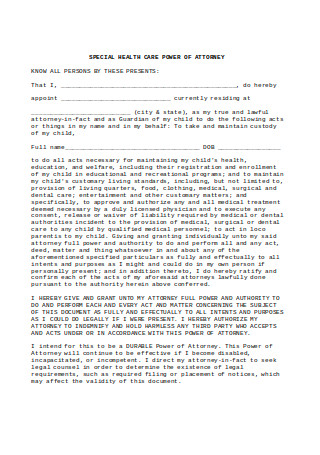
Special Health Care Power of Attorney
-
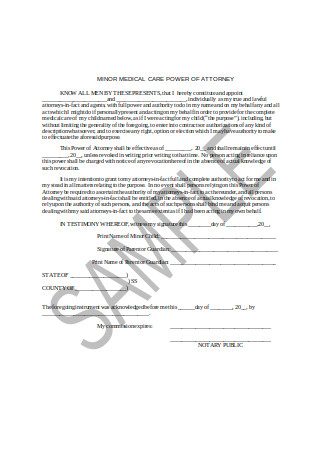
Minor Medical Power of Attorney
FREE Medical Power of Attorney Form s to Download
50+ Medical (Health Care) Power of Attorney Form Samples & Templates
What Is a Medical (Health Care) Power of Attorney?
The Importance of a Medical (Health Care) Power of Attorney
How to Make a Medical (Health Care) Power of Attorney
Medical Power of Attorney vs. Financial Power of Attorney
The Dos and Don’ts of a Medical (Health Care) Power of Attorney
A medical (health care) power of attorney ensures that people are able to receive the type of care they want and need without someone trying to violate their wishes. Choosing someone to obey your desires through a medical (health care) power of attorney form gives you more control over the situation and eliminates the conflict between family members and friends who will likely find themselves in the middle of it all.
What Is a Medical (Health Care) Power of Attorney?
This is a legal document that appoints one person as the health care agent of another. He or she is given the authority to act or decide on behalf of the main subject when the person is no longer in the right physical or mental state to act alone. It helps assure that you receive the appropriate medical treatment and care you require when you are no longer capable to make these decisions yourself. You can allow a trustworthy friend or family member to handle these matters under your consent, as long as their duties in the POA are properly conveyed. However, this directive may only be activated if a doctor provides written confirmation of your incompetence. Most hospitals and health care facilities require the determination of at least two physicians to enforce the POA. Note that the representative does not have the power to make an end-of-life decision unless the principal permits the act as an option in the medical power of attorney form. That’s because the exact responsibilities of the representative would only depend on the instructions provided in the document.
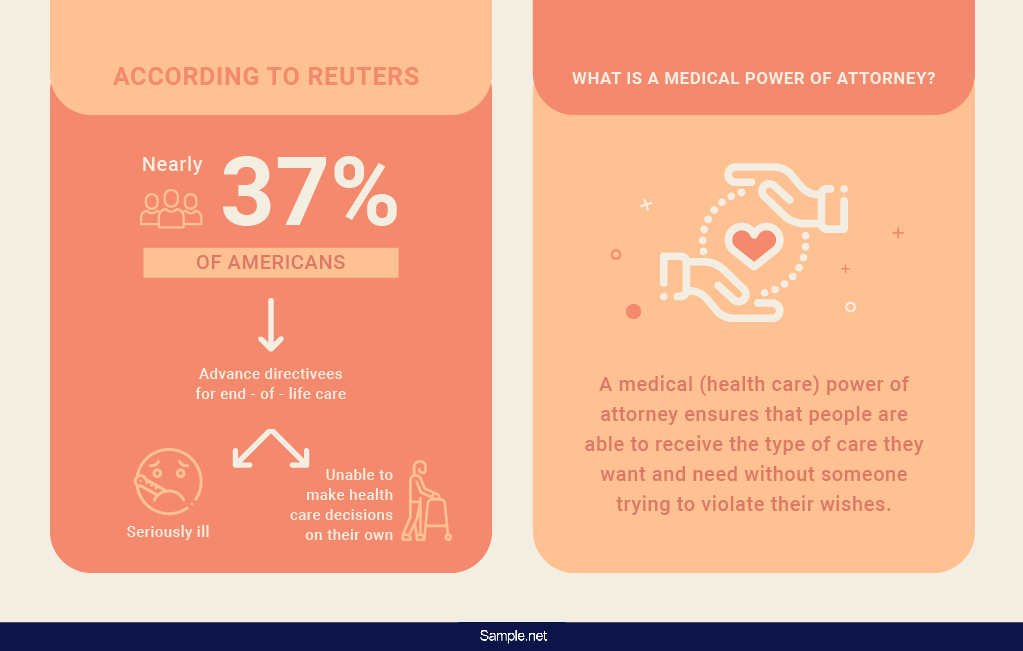
The Importance of a Medical (Health Care) Power of Attorney
Designating someone as your representative in the event of incapacity is not an easy decision to make. Given the impact of the POA on your life and your future, the document must be as detailed as possible to ensure that your best interests are understood and followed accordingly. A medical power of attorney is slightly more complex compared to a living will because of how it assigns the right to make crucial medical decisions to someone else. While it’s easy to assume that those of an older age are more likely to find this POA useful, anyone can benefit from an advance directive for when they are unable to consent to treatment following an accident or injury. It doesn’t matter how old or healthy you are at the moment, having a medical power of attorney in place is sure to come in handy at some point in your life.
How to Make a Medical (Health Care) Power of Attorney
Life can be unpredictable. One day you’re running a cross-country marathon, the next day you find yourself in a hospital bed waiting for the medical personnel to conduct an emergency surgery on you. You never know when you might need a power of attorney to guide someone in making health care decisions for your own good. But because this document is meant to bind two parties to a legal agreement, the exact scope of the arrangement must be clarified in the POA to minimize legal risks. Below is a step-by-step guide to help you draft a medical (health care) power of attorney with ease.
Step 1: Decide on a Trustworthy Agent
As much as you don’t want to alarm anyone about your sudden desire to secure a medical power of attorney, deciding on who your agent will be is done in the early stages of the drafting process. This is your chance to appoint someone that you believe is reliable enough to understand and respect your moral and religious beliefs. For legal and ethical reasons, avoid designating your doctor or any health care provider as your agent unless you share a personal relationship with the said individual. The location, age, health, and religious and lifestyle choices of the chosen agent must be considered when making this decision. Make sure that the person you choose is aware of the arrangement and has agreed to the terms covered by the POA. The medical power of attorney must not be executed until the medical agent accepts the role.
Step 2: Familiarize Your State’s Requirements for a Medical Power of Attorney
Laws that govern a power of attorney may vary from state to state. Some states have a medical power of attorney form that users can fill out to meet their needs as well as the legal requirements that the state conforms to. You also need to consider the type of medical power of attorney that applies to your specific case. For instance, a durable medical power of attorney immediately goes into effect when the document is signed, while a springing medical power of attorney is only executed when the principal is incapacitated and could no longer make any medical-related decision alone.
Step 3: Draft the Document
Now that you are familiar with your state laws regarding the medical treatment and attention you receive through the POA, you can download or obtain a copy of the standardized form from certain government offices in the region. If you wish to use a template of the same kind from a different source, make sure the copy meets the necessary requirements of a valid POA for it to be enforceable. The principal and the agent must be clearly identified in the document along with the power that he or she has or will have in the future. To play it safe, you can also name a subsequent medical power of attorney if the first one is unable or unwilling to serve. Be sure to state the specific directions that the medical agent must follow to meet your best interests. Don’t forget to sign the document once you have finished.
Step 4: Inform Others about the POA
You can secure two copies of the POA for you and your agent to store in a safe place. A separate copy of the POA may be given to your primary health physician or any other doctors that will likely be responsible for handling your case. It’s best to inform your friends and family about the existence of the POA and the scope of its terms to make everyone aware of what it covers. That way, the people who are close to you may know how to act when the unexpected occurs.
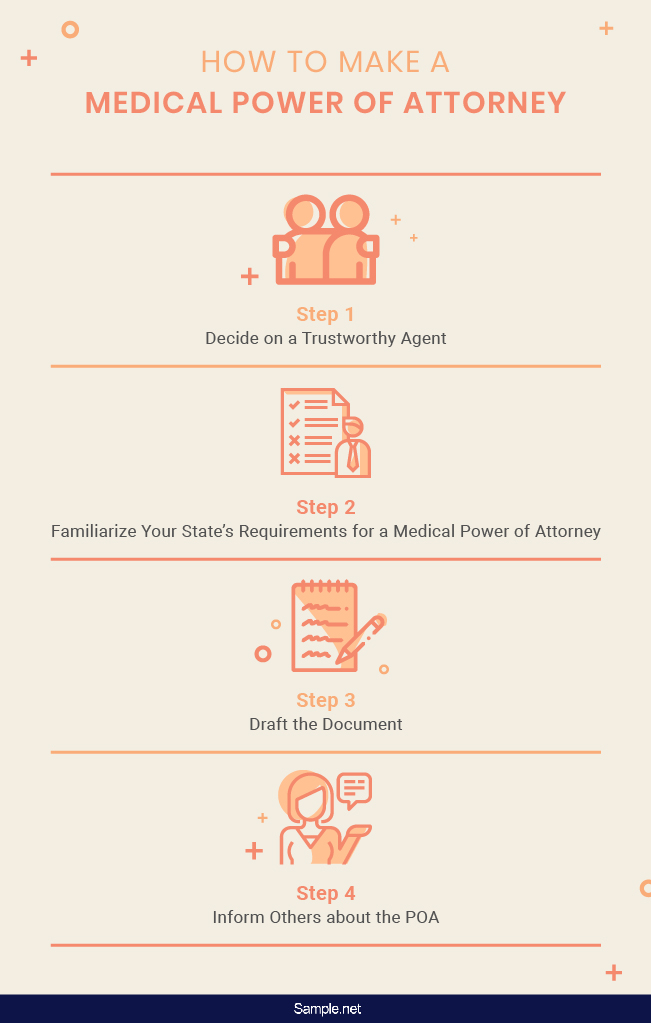
Medical Power of Attorney vs. Financial Power of Attorney
A medical power of attorney functions differently from a financial power of attorney. They are typically created in separate legal documents so as not to confuse readers on the terms and conditions of each agreement. A medical power of attorney may be used temporarily or for a long-term purpose. It generally specifies the provisions for a wide range of medical-related actions that may affect the overall health of the principal. With a financial power of attorney, an agent is appointed to oversee your finances for the time being. If you cannot physically or mentally handle these financial affairs, the person acting on your behalf is given the permission to step in. But unlike a medical power of attorney, a financial power of attorney does not require the intimate knowledge of religious beliefs and critical end-of-life wishes that the former ought to have. The chosen agent must simply possess enough financial acumen to manage the responsibilities effectively.
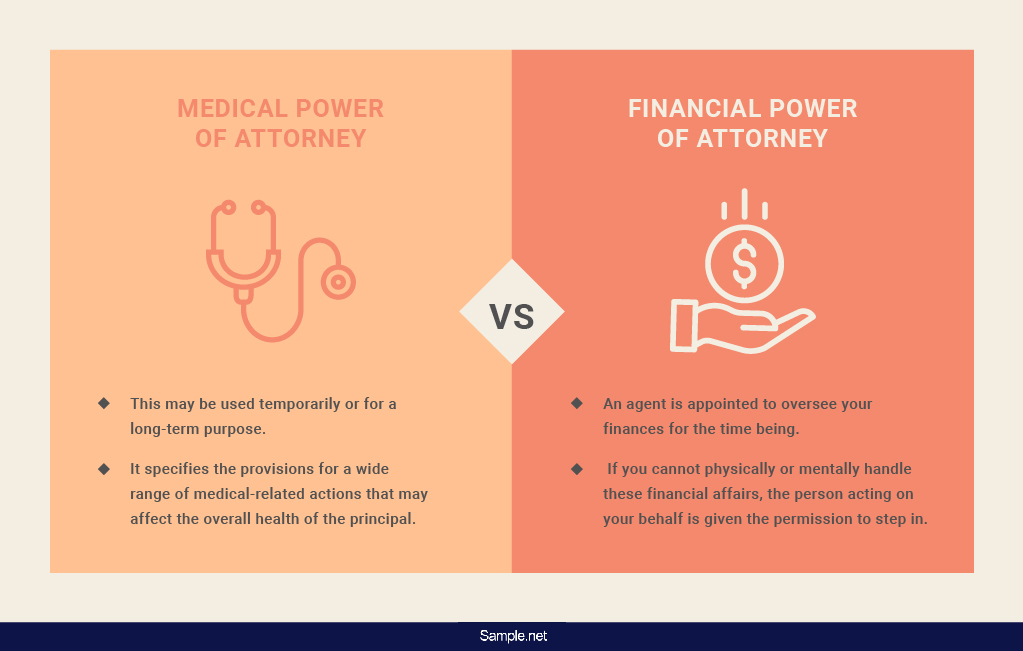
The Dos and Don’ts of a Medical (Health Care) Power of Attorney
According to the American College of Emergency Physicians, only about a quarter (26%) of Americans have an advance directive in place due to society’s lack of awareness of its significance. The medical power of attorney is one of the most important decisions you’ll ever make when deciding how your medical affairs will be handled and by whom. But composing these legal documents is far from easy, especially for those who lack the knowledge and the experience in the topic. So if you’re thinking about creating a medical power of attorney, there are a few things you must consider before getting the document signed.
The Dos
1. Do let an attorney draft the document.
Hire an experienced lawyer who could help you draft the POA. Drafting it on your own can often create loopholes in the agreement that you’re likely to have a hard time correcting later on. While working on the POA alone might seem like a cost-efficient alternative, it’s bound to prolong the process and complicate the directive more than you expected. It’s best to work with a lawyer who has the patience to explain everything clearly enough for you to understand as you continue to move forward in the process.
2. Do choose someone you can trust.
Select an agent that you know you can trust your life with—literally. It doesn’t have to be a blood relative or a close friend, as long as the person you are appointing is competent enough to make crucial medical decisions on your behalf. It may be a challenge to find someone who can willingly take on the role of an attorney-in-fact, considering the weight that the arrangement carries. Hence, make sure to discuss things thoroughly with a potential agent before you name them in the POA. You need to take this part of the process seriously if you want to protect yourself from unwanted treatments. The person you choose must be efficient, responsible, and committed to prioritizing your best interests before taking action.
3. Do specify the responsibilities of the agent.
A medical power of attorney may contain provisions that cover the principal’s personal care management, medical treatments, and care assistance. You can choose between a general power of attorney or limited power of attorney to determine the scope of your medical POA. To be more specific with your terms, the latter would be a wiser choice. This identifies the extent of authority granted to the agent to avoid an abuse of power. The length of time that the arrangement adheres to, along with its termination, would depend on what the principal specifies in the POA as well.
4. Do review the revocation process.
You are allowed to revoke the POA at any given time, as long as you are mentally competent to make the decision. This revocation must be written, signed in front of a notary public, and delivered to the attorney-in-fact for finalization. Understanding the necessary steps to complete the process is essential to ensure that the actions taken are done within lawful constraints. If you need to update the POA for whatever reason, make sure that those involved in the agreement are notified beforehand.
5. Do have a backup plan ready.
If for some reason the agent you have initially chosen is unable to perform the tasks on your behalf, it’s a good idea to name a successor agent just in case. You can even designate a POA monitor to keep the agent under surveillance and make sure that he or she is able to uphold the responsibilities granted by the principal. Protecting your POA should be your utmost priority for when the worse comes to worst.
The Don’ts
1. Don’t make an impulsive decision.
Deciding on the terms of your POA must be done carefully. Avoid naming an agent you aren’t completely sure about at the moment, or you might find it difficult to make the change at the later stages of the process. The first person that comes to mind when selecting an agent may not be the best person for the job. Though it’s easy to think that a family member would be an ideal option, it’s not always the case for people who don’t share the best relationship with their immediate family. Thus, a lot of thought must be put into your decision before the chosen agent is specified.
2. Don’t force the potential agent to sign the POA.
If a person is having doubts about accepting the medical power of attorney, resist the urge to coerce them to meet your demands. Someone who doesn’t feel confident about being your attorney-in-fact may not commit to the responsibilities expected of him or her. The truth is, not everyone would be too keen on the idea of making crucial medical decisions for an individual who is incapable of doing so themselves. The pressure that comes with the responsibility is not something that somebody would be willing to handle, so don’t feel compelled to name the person if the thought of it does not bring you peace.
3. Don’t rely on a pre-made POA from the Internet.
Using a legal instrument to help hasten a drafting process is only a good option if you take the time to personalize the document before having it signed. A power of attorney template can be a valuable tool in some circumstances. Not only does it comply with the legal standards of a POA, but it also follows a structured business format to maintain the document’s formality. However, you need to be careful about the template you use. Medical powers of attorney are supposed to be specific to the principal’s case. The templates you find online are merely a generalized version of what the document should be like. With that in mind, ensure that your POA is customized and reviewed prior to signing it.
4. Don’t be afraid to ask questions.
Legal documents can be very confusing to the average person. Assumptions can also be dangerous. This can often lead to misinterpretations and disagreements between the principal and the agent, or other third parties involved in the arrangement. If you hired a lawyer to help you draft the document, don’t hesitate to ask questions on matters that concern you. You can also seek assistance from a legal expert if the provisions and stipulations in the POA don’t make sense to you. When it comes to decisions that involve your wellbeing, make sure the power of attorney is clear and specific about your wishes. Though time-consuming, you can always change them if you need to.
5. Don’t delay the process.
There’s nothing wrong about being prepared for the unforeseeable future. Regardless of age and health, the medical power of attorney should be useful during the most unexpected circumstances. Acknowledge the need for such by laying out your ideas on paper. The draft should guide you in your discussions with the agent and the attorney as you finalize your plans.
A medical (health care) power of attorney is an advance directive that anyone can benefit from. Creating the POA will ensure that no matter what happens in the future, any decisions that concern the medical treatment and care you receive during specific circumstances conform to your personal desires and expectations.
